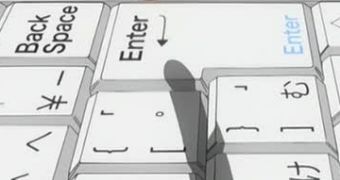Computer security company e-Solutions has developed an innovative system based on individual typing behaviors. The new technology is inspired by the fact that humans can tell a friend from another by different clich?s and patterns in language.
Computers equipped with such identification technologies can analyze different interaction factors, such as typing speed, rhythm and agility. The new algorithms are especially tailored to replace the old biometric authentication technology, as the latter is becoming more and more unsafe, not to mention the false negative authentication issues it might trigger.
The e-Solutions authentication system adds an extra layer of security to the regular log-in systems. While fingerprint readers and retinal scanners are problematic as well as extremely expensive, the company's Remote Biometric Authentication system analyses miscellaneous interaction factors, in order to create an individual user profile, also known as a "typing fingerprint".
The underlying software application takes note of different aspects while typing, such as pauses, mistakes, speed or hesitations, some features that are believed to be as identifiable as one's handwriting. More than that, the results are not biased by either the working environment or by the keyboard being used, even if the user has never used the respective model before.
"Two-factor authentication has become commonplace in confirming remote worker identity. But it can be cost prohibitive for many organizations," said Angus Stewart, managing director at e-Solutions. "Remote Biometric Authentication requires no additional hardware, management costs or user training and can be built into other applications easily," he continued.
While it may be true that biometric security can be sometimes tricked into granting an unauthorized person access to a computing system, it has the great advantage of being extremely simple to use and almost working out of the box. Despite the fact that there are no additional details about how the Remote Biometric Authentication system works, it is alleged that it would require some "training" before storing the users' profile.
Last, but not least, the typing speed and accuracy can be influenced by multiple external factors, such as fatigue or loss of focus, which would have the users fail as they make more typing mistakes than usually.

 14 DAY TRIAL //
14 DAY TRIAL //